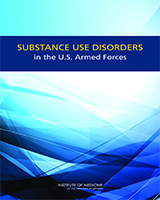NCBI Bookshelf. A service of the National Library of Medicine, National Institutes of Health.
Problems stemming from the misuse and abuse of alcohol and other drugs are by no means a new phenomenon, although the face of the issues has changed in recent years. National trends indicate substantial increases in the abuse of prescription medications. These increases are particularly prominent within the military, a population that also continues to experience long-standing issues with alcohol abuse. The problem of substance abuse within the military has come under new scrutiny in the context of the two concurrent wars in which the United States has been engaged during the past decade--in Afghanistan (Operation Enduring Freedom) and Iraq (Operation Iraqi Freedom and Operation New Dawn). Increasing rates of alcohol and other drug misuse adversely affect military readiness, family readiness, and safety, thereby posing a significant public health problem for the Department of Defense (DoD).
To better understand this problem, DoD requested that the Institute of Medicine (IOM) assess the adequacy of current protocols in place across DoD and the different branches of the military pertaining to the prevention, screening, diagnosis, and treatment of substance use disorders (SUDs). Substance Use Disorders in the U.S. Armed Forces reviews the IOM's task of assessing access to SUD care for service members, members of the National Guard and Reserves, and military dependents, as well as the education and credentialing of SUD care providers, and offers specific recommendations to DoD on where and how improvements in these areas could be made.
Contents
- THE NATIONAL ACADEMIES
- COMMITTEE ON PREVENTION, DIAGNOSIS, TREATMENT AND MANAGEMENT OF SUBSTANCE USE DISORDERS IN THE U.S. ARMED FORCES
- Reviewers
- Preface
- Acknowledgments
- Acronyms and Abbreviations
- Summary
- 1. Introduction
- 2. Understanding Substance Use Disorders in the Military
- UNDERSTANDING SUBSTANCE USE DISORDERS
- SCOPE OF THE PROBLEM
- DEVELOPMENT OF MILITARY SUBSTANCE ABUSE POLICY: A BRIEF OVERVIEW
- COMPOSITION AND SOCIODEMOGRAPHIC CHARACTERISTICS OF THE ARMED FORCES
- PREVALENCE OF SUBSTANCE USE IN THE MILITARY
- HEALTH CARE BURDEN OF SUBSTANCE USE DISORDERS
- CONCEPTUAL APPROACH TO PREVENTION, INTERVENTION, AND TREATMENT OF ALCOHOL USE PROBLEMS
- SUMMARY
- REFERENCES
- 3. The Military Health System
- 4. Changing Standards of Care for Substance Use Disorders
- 5. Best Practices in Prevention, Screening, Diagnosis, and Treatment of Substance Use Disorders
- 6. Policies and Programs on Substance Use Disorders
- 7. Access to Care for Substance Use Disorders
- 8. Substance Use Disorder Workforce
- 9. Conclusions and Recommendations
- APPENDIXES
- Appendix A Study Activities
- Appendix B S. 459 (111th): SUPPORT for Substance Use Disorders Act
- Appendix C Sec. 596 of Public Law 111–84, October 28, 2009
- Appendix D Program Reviews
- Appendix E Features of TRICARE and Related Purchased Care Plans
- Appendix F Workforce Standards for Substance Use Disorder (SUD) Care
- Appendix G Access Standards for TRICARE Prime Enrollees
- Appendix H Levels of Care
- Appendix I Summary of Policy-Relevant Strategies for the Prevention of Alcohol-Related Problems
- Appendix J Biosketches of Committee Members and Staff
This study was supported by the U.S. Department of Defense through an interagency agreement with the U.S. Department of Health and Human Services under Contract No. HHSP23337030T. Any opinions, findings, conclusions, or recommendations expressed in this publication are those of the author(s) and do not necessarily reflect the view of the organizations or agencies that provided support for this project.
Suggested citation:
IOM (Institute of Medicine). 2013. Substance use disorders in the U.S. armed forces. Washington, DC: The National Academies Press.
NOTICE: The project that is the subject of this report was approved by the Governing Board of the National Research Council, whose members are drawn from the councils of the National Academy of Sciences, the National Academy of Engineering, and the Institute of Medicine. The members of the committee responsible for the report were chosen for their special competences and with regard for appropriate balance.
- NLM CatalogRelated NLM Catalog Entries
- Review Treatment for Posttraumatic Stress Disorder in Military and Veteran Populations: Final Assessment[ 2014]Review Treatment for Posttraumatic Stress Disorder in Military and Veteran Populations: Final AssessmentCommittee on the Assessment of Ongoing Efforts in the Treatment of Posttraumatic Stress Disorder, Board on the Health of Select Populations, Institute of Medicine. 2014 Jun 17
- Combat duty in Iraq and Afghanistan, mental health problems and barriers to care.[US Army Med Dep J. 2008]Combat duty in Iraq and Afghanistan, mental health problems and barriers to care.Hoge CW, Castro CA, Messer SC, McGurk D, Cotting DI, Koffman RL. US Army Med Dep J. 2008 Jul-Sep; :7-17.
- Review Acute Pathophysiology of Blast Injury—From Biomechanics to Experiments and Computations: Implications on Head and Polytrauma.[Brain Neurotrauma: Molecular, ...]Review Acute Pathophysiology of Blast Injury—From Biomechanics to Experiments and Computations: Implications on Head and Polytrauma.Chandra N, Sundaramurthy A. Brain Neurotrauma: Molecular, Neuropsychological, and Rehabilitation Aspects. 2015
- Review Returning Home from Iraq and Afghanistan: Assessment of Readjustment Needs of Veterans, Service Members, and Their Families[ 2013]Review Returning Home from Iraq and Afghanistan: Assessment of Readjustment Needs of Veterans, Service Members, and Their FamiliesCommittee on the Assessment of the Readjustment Needs of Military Personnel, Veterans, and Their Families, Board on the Health of Select Populations, Institute of Medicine. 2013 Mar 12
- Operation Enduring Freedom (OEF) and Operation Iraqi Freedom (OIF) military mental health issues. Information on the wars' signature wounds: posttraumatic stress disorder and traumatic brain injury.[Pa Nurse. 2010]Operation Enduring Freedom (OEF) and Operation Iraqi Freedom (OIF) military mental health issues. Information on the wars' signature wounds: posttraumatic stress disorder and traumatic brain injury.Wieland D, Hursey M, Delgado D. Pa Nurse. 2010 Sep; 65(3):4-11; quiz 12-3.
- Substance Use Disorders in the U.S. Armed ForcesSubstance Use Disorders in the U.S. Armed Forces
Your browsing activity is empty.
Activity recording is turned off.
See more...
